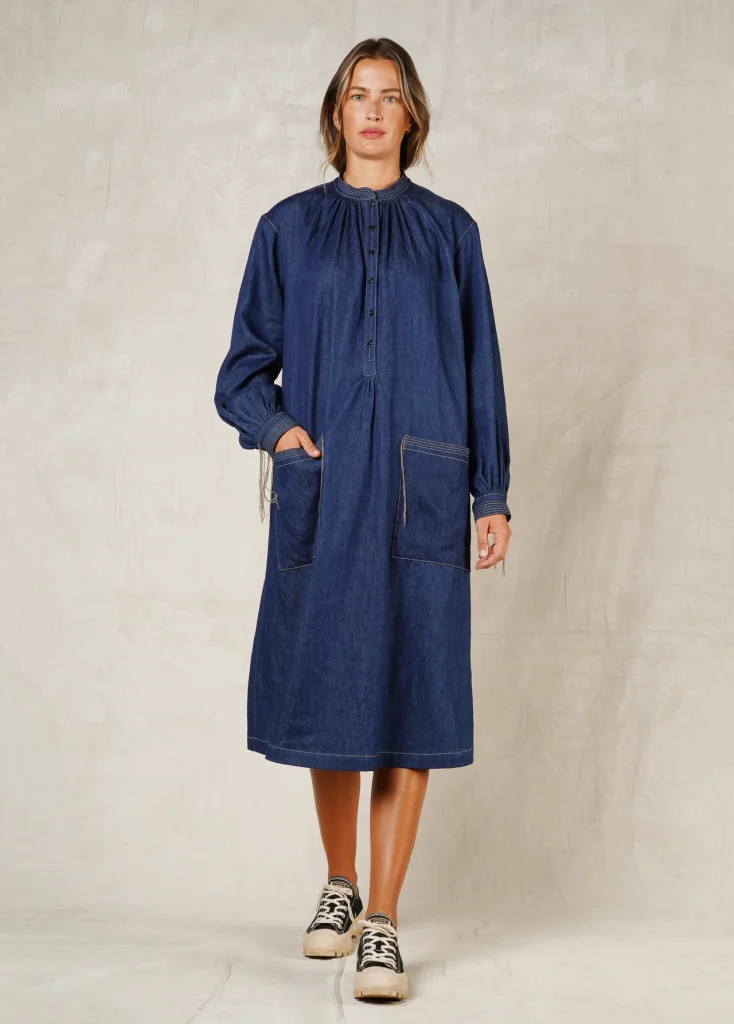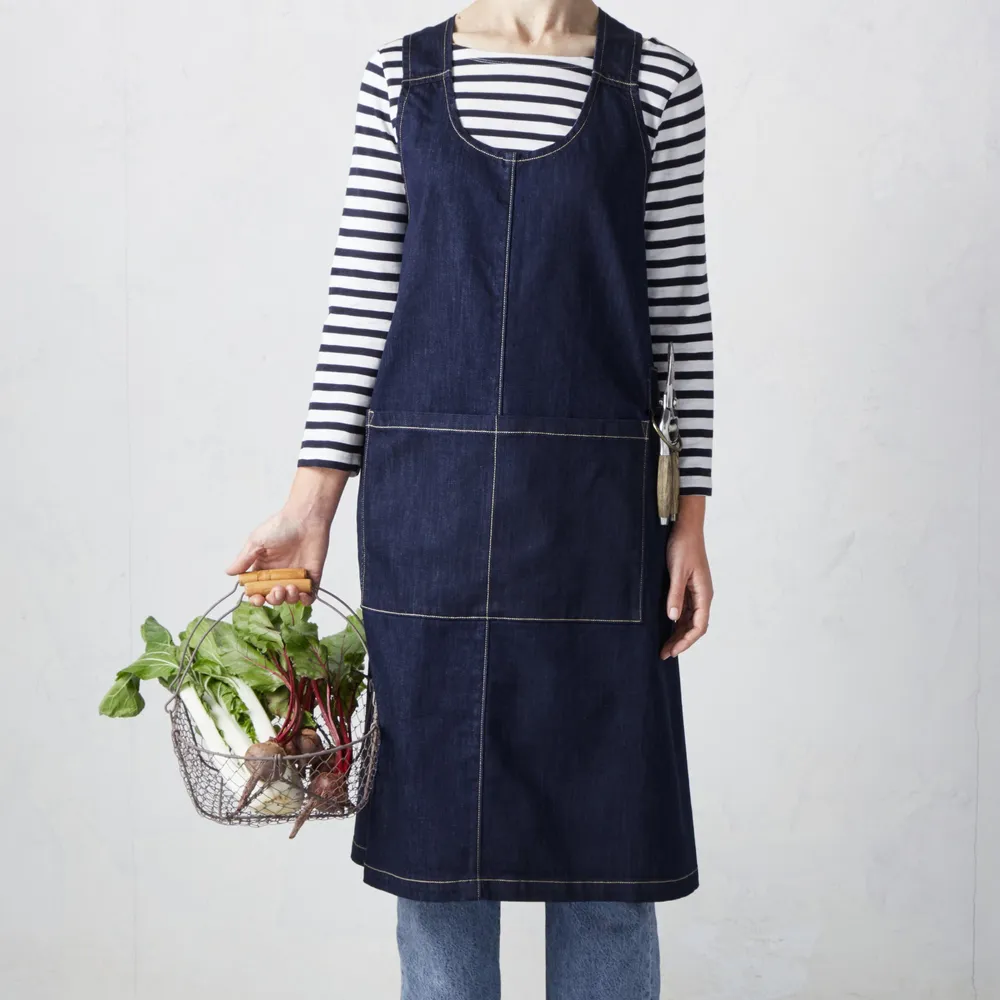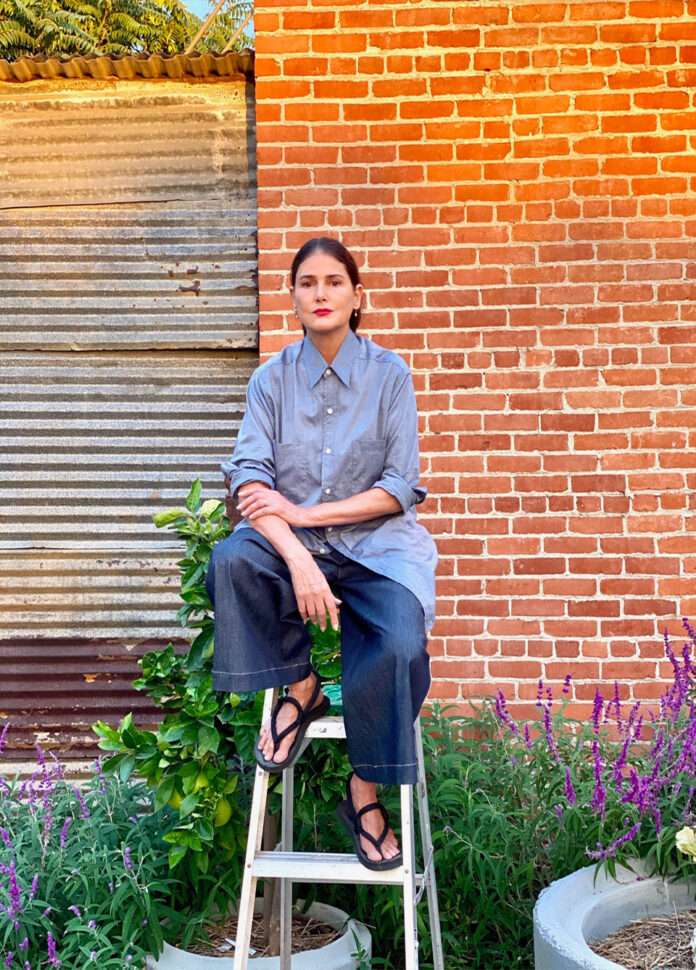Rozae Nichols, founder of Flora Animalia, spent more than four decades designing utilitarian workwear. But in 2016, she decided it was time to step away from the fashion industry for good.
Nichols, a long-time advocate for animal rights and the environment, wanted to move away from the systemic abuse that is ever-present in the global food and fashion industries. So she created a new project to help herself and others sustain a more ethical way of living via an urban edible garden.
Nichols named the project Flora Animalia and decided to start running workshops and seminars for local people. But, during her time laboring in the garden, she increasingly found that her clothes just weren’t up to the job. So she took matters into her own hands and started to make her own. Eventually, a new version of Flora Animalia was born, specializing in functional, practical, beautifully designed gardening clothes for everyone. Fashion had found her again.
Finding the Flora Animalia way
“Making clothing, at least for me, is an emotionally charged vocation,” Nichols told Ethos. “I started making my own clothes when I was very young. And I feel fortunate that I’ve been able to express some of my ideas about form, function, production, and beauty through my commitment to the hard work and intricate craft of making clothes.”
Her designs now are respectful of the earth, the animals, and people — that is the Flora Animalia way. Gardening, of course, is still at the heart of the brand, which now represents two of Nichols’ biggest passions, but also her hopes for the future.

Animal agriculture, which is at the root of the world’s food system, is driving up emissions, destroying forests, and draining natural resources, including water and land. Multiple studies now suggest that a plant-forward, local approach to food is not just sustainable, but essential for the health of the planet.
“The garden is as real as it is a metaphor,” Nichols said. “We human animals [need to] cultivate a personal, communal, and global path towards a more compassionate plant-based way of living, as survival, actually.”
We caught up with Nichols to learn more about Flora Animalia, its sustainability ethos, and its commitment to ethical production.
*This interview has been edited for length and clarity.
Ethos: Can you tell me more about Flora Animalia’s unique journey from a garden-focused project to a fashion brand?
Rozae Nichols: Originally, the concept was to create a kind of hybrid of an edible-community garden where friends and the local community could gather and engage in our creative and gardening workshops, and share ideas and conversation towards greater independence from our broken food system— in particular from the cruel & destructive impact of animal agriculture.
My long-time dream was to build my own creative studio with an edible garden. Eventually, I did, and it was my hard work in the garden that inspired a small collection of functional gardening clothes, which started with aprons.
Ethos: Safe to say it has grown significantly since then. The range of clothing now includes beautifully designed shirts, pants, and coats that, of course, work in the garden, but you could wear them to the farmer’s market, to work, anywhere really.
RN: My hope is that many of these garments are put to use, worn tough, and enjoyed, dare I say, as possible heirloom quality garden and utilitarian pieces.
Ethos: You mentioned a broken food system. The way we eat certainly exploits animals and the planet, and so do the clothes we wear. Is it important to you to ensure that sustainability is woven into every aspect of Flora Animalia?

RN: It’s certainly not lost on me that there is absolutely no need to produce one more garment when the planet is choking and coughing up enough clothing to outfit generations of its 8 billion humans. Cognitive dissonance certainly sustains our desires. So in my selfish desire to make things, I gave in to the emotional need to create yet another something- and set forth to build a small collection with the most responsible efforts possible.
Ethos: What steps have you taken to ensure design and production are ethical and environmentally friendly?
RN: More than 90 percent of our collections are made from GOTS-certified organic cotton, Belgian linen, and a portion from local dead-stock fabrics. We cut and sew all of our garments in-house. Our small group of employees are paid well above industry standards and warmly embraced as friends and respected as my co-creative artisans. It’s a creative production process that embraces everyone’s talent and skills. We make very small quantities each month and re-issue nearly every style.
Ethos: Could you share more about the values and principles that drive your commitment to sustainability?
RN: As I said, and I think most will agree, we certainly don’t need any more clothes- but most of us do need to work. To have been able to find joy and purpose in my work in an industry so wrought with vanity, waste, and overconsumption- all of which I acknowledge myself as both a naive and willing participant. I also recognize that there is always an opportunity to push forward with mindful solutions even when that too ironically feels in conflict with our very survival.
Check out Flora Animalia here.
Related on Ethos:


